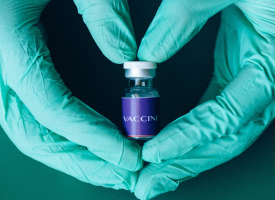Dr Omar Khorshid on mandatory vaccination across entire healthcare system
Transcript: Dr Omar Khorshid, calls for Mandatory vaccination across the entire healthcare system from WA, Tuesday, 31 August 2021
OMAR KHORSHID: The AMA is today calling on National Cabinet to take the lead when it comes to protecting our healthcare system from COVID as we move forward, both in New South Wales and around the rest of the country to living with COVID.
We must take the steps necessary to make sure our health and hospital system is ready. The very first part of that is to ensure that all healthcare workers and all staff that work in hospitals, healthcare centres, and pharmacies are vaccinated against COVID. We call on the National Cabinet to make the decision that it will be mandatory for all healthcare workers in all those settings, and for the states and territories to put in the necessary public health orders to make mandatory vaccinations a possibility for every health employer around the country. This may seem like a drastic step, but it's a necessary step to ensure the hospitals remain safe for the patients and for staff. You should not be worried about contracting a potentially deadly virus when you enter a healthcare facility. And we have an opportunity to make sure our healthcare sector is properly protected against COVID before we expose people to much risk in those settings. It is important for GPs and other small businesses to have the backing of Government when it comes to mandating vaccinations. It's actually pretty difficult, legally, with our privacy laws, with our employment laws to mandate vaccination. But at the moment, as an employer in Australia, the advice is that each employer has to go and get their own legal advice, and that makes it really difficult for employers to do the right thing. But our states and territories still have the power to put out a public health order, as has happened already in the South Wales. We're calling today for every state and territory to do exactly that.
QUESTION: Do you know what percentage of health workers aren't currently vaccinated?
OMAR KHORSHID: We don't have numbers right across our health sector, but we do know, for instance, that in our hospital sector, that under 15 per cent of our nursing staff are not currently vaccinated. And we suspect that when you look broader at all the staff who work in hospitals, that that number will actually be higher. So whilst we are still waiting for vaccines to be available to every Australian, we need to set the expectation right now that our employers, that our system, that our community expects that healthcare workers are vaccinated against COVID.
QUESTION: What about small businesses? Does this advice extend further to them?
OMAR KHORSHID: So we're talking today about small healthcare businesses, because we've seen COVID being spread in GP practises, in pharmacies, already in New South Wales, and we need to make sure that all the staff working in those facilities are protected. But of course, this advice should go broader to all employers. They should have the protection of the Government in order to keep their workplaces safe for every employee. And right now, that's actually very difficult for employers in Australia.
QUESTION: Are you concerned that mandating vaccines for anybody who works in the health system will cause staff to exit? And we already have a shortage, particularly here in WA, but right across the nation of care workers. Are you concerned about that at all?
OMAR KHORSHID: We are, of course, concerned about the potential to lose a small number of health staff from hospitals that are already very short in all staff. But at the end of the day, we still have to protect people and we cannot have a workplace that’s safe in a COVID environment or if COVID is in our community if every single worker in our healthcare facilities aren't vaccinated. It's just a necessary practical step, even though it's one that will be quite uncomfortable for many.
QUESTION: New South Wales already mandated this for healthcare staff. Why do you think other states aren't following?
OMAR KHORSHID: Well, New South Wales is facing a COVID crisis right now. But for other states and territories, it's in the future. So what we're calling for is to be prepared. Don't wait until you've got a COVID outbreak to actually take the necessary steps to protect hospitals and health facilities, but make the call now, give people a deadline that's reasonable, that gives them an opportunity to go and get a vaccine. And I think that ought to be a strong step in order to prepare ourselves for living with COVID into the future.
QUESTION: When you say in the future, have you had modelling or internal communication to when we're expecting an outbreak?
OMAR KHORSHID: We have outbreaks of COVID in Australia right now. And here in Western Australia, it's only a matter of a single breach of quarantine, a single wharf worker contracting COVID going on to a ship, or a truckie coming over the border. We could have a COVID outbreak tomorrow in Western Australia, and it's absolutely critical that we're not complacent, that we realise how important it is to get everybody vaccinated as fast as possible. And of course, those at the very frontline are those in our health care system.
QUESTION: Where do you lie on this debate between the PM and the Premier, with the Premier saying that WA could be a few months behind the rest of the country in opening up? The PM on radio this morning saying we've got to learn to live with it at 80 odd per cent.
OMAR KHORSHID: We do need to learn to live with COVID, but learning involves planning ahead. We, as the AMA, are actually calling on National Cabinet this week to take the necessary steps to protect our healthcare system. Now, part of that might mean actually doing the modelling and saying: well, actually, our healthcare system can't cope with opening up at 80 per cent of the adult population. Maybe that number needs to be higher. Maybe it needs to include children hitting the target, but also what do they need to do in our hospitals, in our dental practises, to get them ready for COVID? What are the staffing protocols? What are the ways that we can change the way we do business? What extra money do we need to protect our system, to prepare it for dealing with COVID? If we haven't answered these questions before COVID hits states that are not currently experiencing the pandemic, then we miss an opportunity to really limit the impact, limit the number of deaths and illnesses that occur as a result and also limit the chance that our healthcare system would collapse under the weight of COVID and will be unable to provide elective surgery or care for cancer in the future.
QUESTION: So you're just saying, to be clear, that in states like WA, here, perhaps it should be higher than 80 per cent before we start to open up?
OMAR KHORSHID: The modelling needs to be done as to what level of protection in the community we need to protect the hospitals, to make sure our hospitals can cope. Now that's a pretty hard sum to do in Western Australia, where you see elective surgery being stopped in our public sector with no COVID and with no flu. The idea that we could take any extra demand here in Western Australia right now is fanciful and is huge job for the West Australian Government to do for various health care sector, for the challenges ahead.
QUESTION: So above 90 per cent?
OMAR KHORSHID: We could well be looking at numbers above 90 per cent to properly protect Western Australia. But that's no excuse to say that WA's going to keep our borders shut because COVID could come tomorrow in WA. Mark McGowan may not get the choice as to when COVID comes to WA, so we've got to do everything in our power to be prepared, and that involves vaccination, yes, but it also involves preparing the community for the reality that restrictions and lockdowns are part of our longer term future. And we need to spend the money and find the staff and find the processes we need to live with COVID in our hospital sector.
QUESTION: There was some data that was presented to National Cabinet that suggested that if we were to get the Delta variant, it would spread three times as fast as New South Wales. What do you make of that? And if that is the case, are we well-prepared for that?
OMAR KHORSHID: So without vaccination and without lockdowns, Delta spreads incredibly fast, like wildfire, through our community. And unfortunately, in Western Australia, we're lagging behind the rest of the country when it comes to our vaccination rate. So I certainly believe the modelling that says Delta could spread very fast to the community before a lockdown is instituted. But we do also know that the Government of Western Australia would bring a lockdown in as soon as it detected cases, and that would reduce the reproduction rate. The chances that you could eradicate COVID from WA are slim. We've seen Melbourne really struggling, despite a rapid and severe lockdown. We've seen New Zealand unable to eradicate COVID from Auckland, despite a very rapid response and a very severe response. So we should not be sitting on our laurels in WA. We are at risk, and our only solution is to get everybody vaccinated as fast as possible.
QUESTION: In the meantime, while we do get everyone vaccinated, are there any other measures that you'd like to see? Obviously, you know, we're not social distancing, we're not wearing masks, and that data suggests that for every person that contracts that Delta variant here in WA, they'll pass it onto another three and that person will pass it onto another three.
OMAR KHORSHID: Western Australia's been playing with fire for the last year or so, since we've been living a relatively normal life with our borders protecting us. But the AMA has been saying for many, many months now that a smarter way might be to leave a certain level of restriction in place. Maybe we can't have everybody crammed into a pub or a club. Maybe we can't have 60,000 people at the footy. But that's a way to limit the spread when COVID does come into our community. And we've seen with Delta, it only takes one case to suddenly have a huge outbreak, gets ahead of the contact tracers. So would we prefer more restrictions? Yes, we would. But we also recognise that WA overall has been extraordinarily successful. And if we can get everybody vaccinated before we get a COVID outbreak, then there is, of course, the chance that the McGowan Government would have been right, and that this strategy that WA's been taking has been the correct one.
QUESTION: In terms of Indigenous vaccinations, we've seen the low rates in New South Wales and the Federal Opposition says yesterday's death of a man in western New South Wales was inevitable and the first of many. Do you agree?
OMAR KHORSHID: We have recognised for a very long time that our Indigenous community are extremely vulnerable to COVID, given the levels of chronic disease that they unfortunately live with. And the more remote you get from the city, the more serious that risk is. So it's been very clear right from the start and it's extremely disappointing that we are so far behind on our Indigenous vaccination rates. The State Government and all our regional health services, our Aboriginal health services need to do everything they can to make sure that we get these vaccinations out into those communities, because we've seen from western New South Wales just how vulnerable they are.
QUESTION: Is that the key thing to do, to stop more deaths in Indigenous communities?
OMAR KHORSHID: The key thing to do is to vaccinate everybody, but of course, our Indigenous communities have also been protected by the fact that these communities have been separated from the rest of the state, and those restrictions may continue to be in place going forward.
QUESTION: Do you know what the current vaccination rates are in WA's Indigenous communities?
OMAR KHORSHID: I don't have the data on that.
QUESTION: How concerned are you about the ICU beds and the ventilators available here?
OMAR KHORSHID: So, the key aspect of our health system, is not actually the ICU beds or ventilators. It's actually the ability to staff those beds and to put nurses in charge of those ventilators. That has been a challenge in Sydney. It's been a challenge in Melbourne. And it's what we need to aim for in Western Australia.
QUESTION: One more question about BHP. Do you support they are talking about getting everyone off site who hasn't had a vaccine?
OMAR KHORSHID: We recognise how vulnerable our mining industry is to COVID-19 and of course, the critical role it plays in our community and our economic future for Australia. So I can completely understand any employer wanting to mandate vaccination, and it's a conversation we're going to have to continue to have with Australians going forward.
QUESTION: Just quickly on the Grand Final, you mentioned that you were really worried about crowds and [indistinct]… If we do get it here in WA, I mean, are you concerned about that? Are you worried about an outbreak from that?
OMAR KHORSHID: It's absolutely critical that the Grand Final is run in as safe a manner as possible and we have gotten away with our current settings for a very long time so far here in Western Australia. The Grand Final is another potential risk. But of course, if nobody comes in with COVID, then it will be fine. Is it what we would do as an AMA? No. We would suggest that you need to have some social distancing in place at the Grand Final. But we also recognise the unique opportunity that WA has and everyone is of course very keen to take that opportunity.
QUESTION: Should there be mandatory vaccination if you want to go as a spectator?
OMAR KHORSHID: The problem with mandatory vaccination in the community generally is that we just don't have access to vaccines for everybody just now. People are still waiting. So you can't really mandate vaccination right now, today, for the event, until everyone's had fair access to the vaccines.
QUESTION: Thanks very much.



